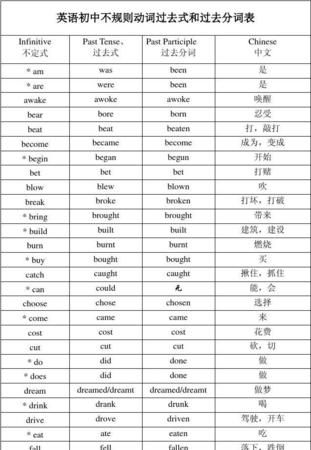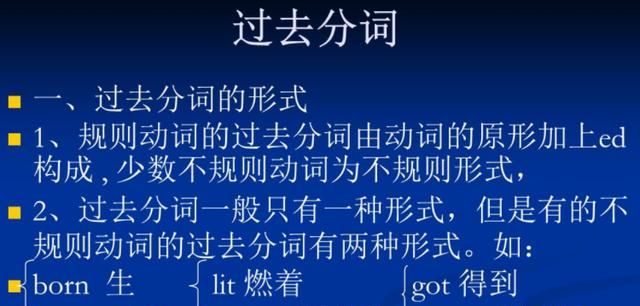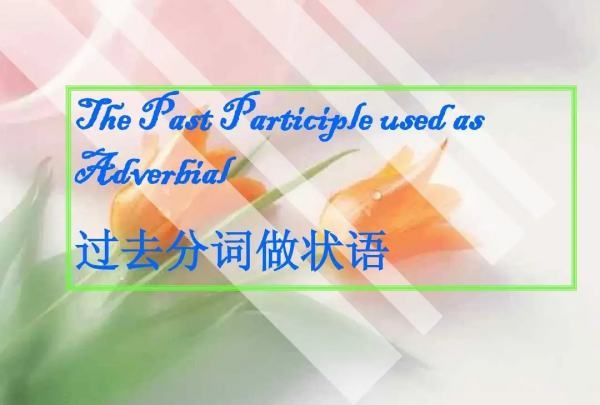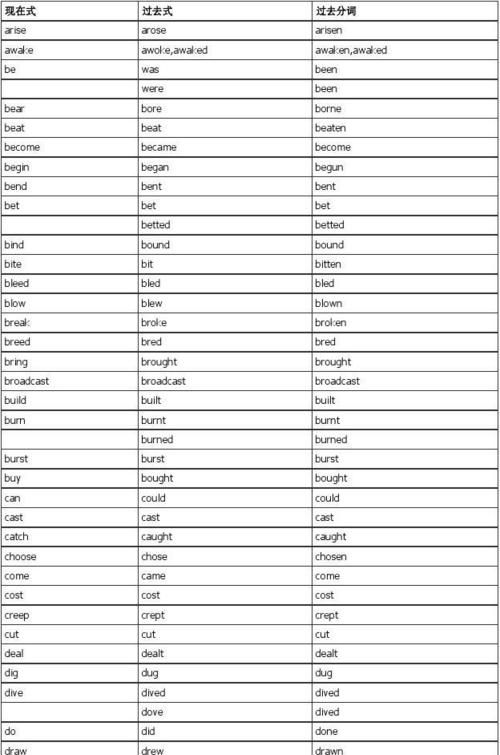本文目录
高中英语冠词语法知识点总结
高中英语的语法知识点过去分词,它可以做状语、可以做表语、也可以做宾补,用法很多,大家都知道吗?下面由我为大家提供关于高中英语过去分词的语法知识点总结,希望对大家有帮助!
过去分词的语法知识点一、做状语
过去分词作状语时,说明动作发生的背景或情况,其等同于一个状语从句。vt 过去分词作状语时与主句主语构成被动关系,表示被动和完成,vi 过去分词表示状态或动作的完成。
Heated , water changes into steam .
The professor came in, followed by a group of young people .
1 作原因状语,等于as / since / because 引导从句
Moved by what she said ,we couldn’t help crying . = ( As we are moved by what she said …
2 作时间状语,等于when 引导时间从句,如果分词表示的动作与谓语的动作同时发生,可在分词前加when/ while / until 等使时间意义更明确。
When heated , water can be changed into steam .
Seen from the hill ,the park looks very beautiful .= ( When the park is seen from the hill…
3 作条件状语等于 if / whether 引导从句
Given more attention , the cabbages could have grown better .= ( If they have been given more attention ….
Compared with you , we still have a long way to go = ( If we are compared with you …
4 作方式或伴随状语
The actress came in , followed by her fans .
She sat by the window , lost in thought .
5 作让步状语
Much tired ,he still kept on working .=(Although he was tired ,) he ….
6 独立主格结构: 当分词的逻辑主语不是主句主语时,分词可以有自己独立的逻辑主语,这种结构称为独立主格结构。常用来表示伴随情况。
The boy rushed into the classroom , his face covered with sweat .
All things considered ,your article is of great value than hers .
Rewrite with proper conjunctions
Example : United we stand, divided we fall.
If we are united, we will stand, but if we are divided,we will fall.
1 Asked what had happened, he told us about it.
→When he was asked what had happened, …
2 Well known for his expert advice, he received many invitations to give lectures.
→Because he was well known for his expert advice, …
3 Given more time, we would be able to do the work much better.
If we were given more time,
4 Once translated into Chinese, the book became very popular among Chinese teenagers.
Once it was translated into Chinese,
5 Deeply interested in medicine, she decided to become a doctor.
Because she was deeply interested in medicine,
6 Left alone at home, Sam did not feel afraid at all.
Although he was left alone at home,
现在分词与过去分词作状语
现在分词作状语时,与其逻辑主语之间是主动关系,;而过去分词与其逻辑主语之间则表示被动关系。
Seeing these pictures, I couldn’t help thinking of those days when I was in Beijing . Seen from the top of a thirty-storeyed building, Beijing looks more magnificent. (see)
选择现在分词还是过去分词,关键看主句的主语。如分词的动作是主句的主语发出,分词就选用现在分词,反之就用过去分词。例如:
Used for a long time, the book looks old.
由于用了很长时间,这本书看上去很旧。
Using the book, I find it useful.
在使用的过程中,我发现这本书很有用
注意:1.系表示主语所处的状态
_____ in thought, he almost ran into the car in front of him. ( lose)
______ in white, she looks more beautiful.( dress)
be lost in
be dressed in
be interested in
be devoted to
be supposed to? be caught in the rain
be seated in
be prepared for
be determined to
2.不与主语保持一致的固定结构
generally speaking 一般说来
strictly/ frankly speaking 严格地说/坦白地说
judging from 从…判断
all things considered 从整体来看
taking all things into consideration 全面看来
例如:Judging from his face, he must be ill.从他的脸色看,他一定是病了。
Generally speaking, dogs can run faster than pigs.
总的来说,狗比猪跑得快。 (speaking 不是dogs 的动作)
Practice
1. Complete each sentences using the P.P. of the right verb.
build frighten trap follow shoot see examine
1 ________ by noises in the night, the girl no longer dared to sleep in her room.
2 The lady returned home, ________ by two policemen.
3 After having been _________ carefully, the room was locked again.
4.______ in 1949, the exhibition hall is over 50 years old.
5 _____ from a distance, the Opera House looks like ship sails.
6 If _____ in a burning building, you should send for help.
7 Although ______ in the leg, he continued firing at the police.
过去分词的语法知识点二、做定语表语
单个过去分词作定语,常放在被修饰词的前面;
过去分词短语作定语,常放在被修饰词的后面。
spoken English
= English which is spoken
terrified people
= the people who are terrified
an organized way
= a way that is organized
affected area 灾区
= the area which is affected
stolen culture relics
= culture relics that had been stolen
the book recommended by the teacher
= the book which was recommended by the teacher
printed articles
= articles that are printed
1) Doctor John Snow was a well-known doctor in London. 定语
2) John Snow told the astonished people in Broad Street. 定语
3) He got interested in the two theories. 表语
4) Neither its cause, nor its cure was understood 表语
Past Participle as the Attribute定语 Past Participle as the Predicative表语
1.terrified people1.people who are terrified
2.reserved seats2.seats that are reserved
3.polluted water3.water that is polluted
4.a crowded room4.a room that is crowded
5.a pleased winner5.a winner that is pleased
6. Astonished children6.children who look astonished
7.a broken vase 7.a vase that is broken
8.a closed door8.a door that is closed
9.the tired audience9.the audience who feel tired
10.a trapped animal10.an animal that is trapped
There are many fallen leaves on the ground.
= There are many leaves which had fallen on the ground. (地上有许多落叶)
Some of them, born and brought up in rural villages, had never been to Beijing.
= Some of them , who had been born and brought up in rural villages, had never been to Beijing.
(他们中的一些人,在农村出生并长大,从没去过北京)
及物动词的过去分词表示结束了的被动动作或者没有一定的时间性,只表示被动关系。
polluted water
= water which is polluted
reserved seats
= the seats which were reserved
trapped animal
= the animal which was trapped
不及物动词的过去分词不表被动,只表示动作发生在谓语动词之前,含有动作完成,动作结束之含义。
boiled water
= water which has boiled
fallen leaves
= the leaves which have fallen
risen sun
= the sun which has risen
过去分词作定语也可用作非限制性定语,前后用逗号隔开。
The books, written by Guo Jingming, are very popular with teenagers. 这些书是郭敬明写的,深受青少年的喜爱。
Some of them, born and brought up in rural villages, had never been to Beijing. 他们中的一些人,在农村出生并长大,从没过北京.
The book _written by the farmer (一本农民写的书) is very popular.
The building built last year (去年建的楼房) now collapsed in the Wenchuan earthquake.
The problem discussed at the meeting yesterday (在昨天会议上讨论的) was very difficult to solve.
The window broken by that naughty boy被那个顽皮男孩打破的) is being repaired.
The children examined in the hospital yesterday昨天在医院检查的) were seriously ill.
The people exposed to the sun (暴露在阳光下的) got sunburnt.
The boy punished severely by the teacher (受到老师严厉惩罚的) is now a college student.
The water delivered to his home (送到他家的水) carried disease.
The English today is quite different from the English spoken in the past 300 years (300年前所说的).
Most of the artists invited to the party (被邀请去参加聚会的) were from South Africa.
The students inspired by the teacher (受到老师鼓舞的)worked harder than ever before.
The Olympic Games, __A_ in 776 B.C. did not include women players until 1912.
A. first played B. to be first played
C. first playing D. to be first playing
①过去分词做定语与其修饰词之间是动宾关系且过去分词表示的动作已完成。
②现在分词作定语表示动作正在发生,与修饰词是主谓关系。
③不定式作定语表示将要发生的动作。
first played in 776B.C. = which was first played in 776 B.C.
2)作表语 表示主语的心理感觉或所处的状态。许多动词的过去分词已经被当作形容词使用。如:disappointed, excited, moved, puzzled, pleased, surprised, lost等。
The window is broken. 窗户碎了。
Don’t get so excited. 别这么激动。
1.用作表语的过去分词被动意味很弱,主要表示动作的完成和状态,此时相当于一个形容词。
2.被动语态的过去分词动词意味很强,句子主语为动作的承受者,后面常跟by短语。
① The glass is broken.
The glass was broken by Tom.
② The windows are closed.
The windows are closed by Jack.
3.表示“感觉流露”的一些过去分词(如:interested,
surprised, excited, frightened, shocked)和一些过去分词(如dressed, drunk, devoted, lost, known)常用作表语,表示状态.其中有些仅表示状态,毫无被动意味。
① How did the audience receive the new play?
They got very excited.
② How did Bob do in the exams this time?
Well, his father seems pleased with his results.
③ She was very disappointed to hear the result.
④ He’s quite experienced in teaching beginners.
过去分词的语法知识点三、作宾补
英语中过去分词可作宾补,(此时的过去分词一般是及物动词)表被动意义或完成意义,有时两者兼而有之。做宾补的过去分词与宾语有逻辑上的动宾关系,即宾语是过去分词动作的对象。如:
She found the door broken in when she came back.(宾补与宾语有被动的关系,表一种状态。)
一. 过去分词用在表状态的动词keep,leave等的后面。
Eg:They kept the door locked for a long time.
Keep your mouth shut and your eyes open.(谚语:少说多看)
Don't leave such an important thing undone.
Don't leave the windows broken like this all the time.
二.过分词用在get,have,make, 的后面。
1.注意“have +宾语+过去分词”的两种情况:
A)表"让某人做某事/让某事(被人)做"
eg: I have had my bike repaired.
The villagers had many trees planted just then.
B)表"遭遇到某种不幸,受到打击/受....影响,蒙受..... 损失"
Eg:I had my wallet stolen on a bus last month.
The old man had his leg broken in the accident.
He had his leg broken in the match yesterday.(MET1986)
2."make+宾语+过去分词",在这种结构中,过去分词的动词必须是表示结果含义的。如:
They managed to make themselves understood in very simple English.
I raised my voice to make myself heard.
三、过去分词用在感观动词watch,notice,see,hear,listen to ,feel,find等后面。如
When we got to school,we saw the door locked.
We can hear the windows beaten by the heavy rain drops.
He felt himself cheated.
The managers discussed the plan that they would like to see carried out the next year.(NMET2000)
四、过去分词用在want,wish,like ,expect等表示“希望,愿望”这一类动词后面做宾补。如
The boss wouldn't like the problem discussed at the moment.
I would like my house painted white.
I want the suit made to his own measure.
I wish the problem settled.
五、过去分词用在“with +宾语+宾补”这一结构中,过去分词与宾语之间是动宾关系。如:
The thief was brought in with his hands tied behind his back.
With many brightly-coloured flowers planted around the building ,his house looks like a beautiful garden.
With everything well arranged,he left the office.
六、过去分词、现在分词、和不定式作宾补的区别。
现在分词作宾补:宾语和补语之间是主谓关系。其动作与谓语动作同时进行。
过去分词作宾补:宾语和补语之间是动宾关系。其动作先于谓语动作。
不定式作宾补: 表一个完成的动作、或表一个很短时间内看到、听到或感觉到的具体动作。
eg:He didn't notice me waiting.
I heard the song sung in English.
I saw him opening the window.
I saw the window opened.
I saw him open the window.
I heard her sing the song in English.

过去式和过去分词有什么不同
1)分词作状语分词在句子中作状语,可以表示时间、条件、原因、结果、让步、伴随等。分
词做状语时,它的逻辑主语与句子的主语一致。作状语的分词相当于一个状语从句。
过去分词表示“被动和
完成”(不及物动词的过去分词不表示被动,只表示完成)。分词可以有自己的状语、宾语或逻辑
主语等。
分词在句子中作状语,使用何种分词,要取决于分词与句子主语的关系:主谓关系用现在分
词,动宾或被动关系用过去分词。3)分词作定语分词作定语时,单个的分词通常放在被修饰的名词之前,分词短语一般置于所
修饰的中心词后面。现在分词修饰的是发出该动作的名词(即与名词有主谓关系),过去分词修饰
承受该动作的名词(即与名词是动宾关系)。
4)分词作宾语补足语现在分词在see,
watch,
hear,
observe,
notice,
feel,
find,
glimpse,
glance等感官动词和look
at,
listen
to等短语动词以及have,
keep,
get,
catch,
leave,
set,
start,
send等使役动词后面与名词或代词构成复合宾语,作宾语补语的成分。

过去分词短语作状语英语造句

过去分词(短语)作状语表示动作发生的背景或情况,在意义上相当于一个状语从句,其逻辑主语就是句子的主语。过去分词(短语)在句中作状语可以表示时间、条件、方式或伴随、让步、原因等。
1.表示时间:过去分词(短语)做时间状语,相当于一个时间从句。
例如:Asked about his family, he made no answer=When he was asked about his family, he made no answer.当问到有关他的家庭的情况时,他没有回答。
2.表示条件:过去分词(短语)做条件状语,相当于一个条件状语从句。这类句子 的谓语动词往往用将来时或情态动词。
例如:United, we stand;divided,we fall=If we are united,we stand;if we are divided, we fall.团结,我们就能独立;分裂,我们必然倒下。

3.表示方式或伴随:过去分词(短语)做方式或伴随状语,可以转换成一个并列句。
例如:The boy slipped out of the room, followed by his pet dog=The boy slipped out of the room and was followed by his pet dog.这个男孩溜出了房间,后面跟着他的宠物狗。
4.表示让步:过去分词(短语)做让步状语,相当于一个让步状语从句。
例如:Rejected many times, the man did not lose heart=Though the man was rejected many times, he did not lose heart.虽然被拒绝了很多次,这个人并没有失去信心。
5.表示原因:过去分词(短语)作原因状语,相当于一个原因状语从句。
例如:Seriously injured, he had to be taken to the hospital=Because he was seriously injured, he had to be taken to the hospital.由于伤得很严重,只好把他送往医院。
现在分词是什么
1.
形式:现在分词V-ing,
过去分词V-ed
(不规则的要专门查辞典)
2
在句中的用法与区别
.A.用在名词前(或后)修饰名词,作定语。此时,现在分词表示“正在进行、发生”和“主动”;过去分词表示“以完成的动作”或、和“被动”。
具体例子(1)分词在名词前:
falling
leaves
(正在漂落的树叶),
fallen
leaves
(躺地上的)落叶
又如我们平时说喝开水
boiled
water(烧开过的),
boiling
water
(正在沸腾的)开水
(2)分词在名词后
a
man
standing
under
the
tree
(正)站在树下的男子
a
thief
caught
in
the
station
已被抓的小偷
B.
用在句中谓语位置,
现在分成表示“正在进行”,过去分词表示“被动”
具体例子:The
man
is
standing
under
the
tree.
The
thief
was
caught
in
th
station.
C.
作为非谓语动词,在句中作为状语(原因,时间,条件等),
现在分词表示与主语为主动(主谓关系),过去分词表示与主句主语被动(动宾关系)
具体例子:
Standing
under
the
three,
the
man
is
waitig
for
the
girl
to
appear
again.
Given
another
chance,
we
can
do
it
better.

以上就是关于过去分词短语正在发生,高中英语冠词语法知识点总结的全部内容,以及过去分词短语正在发生 的相关内容,希望能够帮到您。

